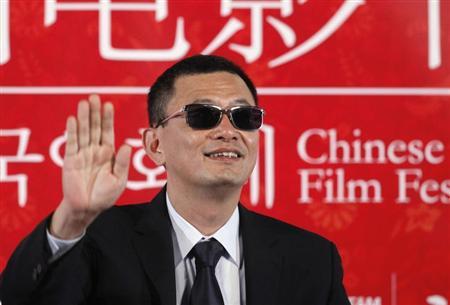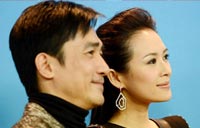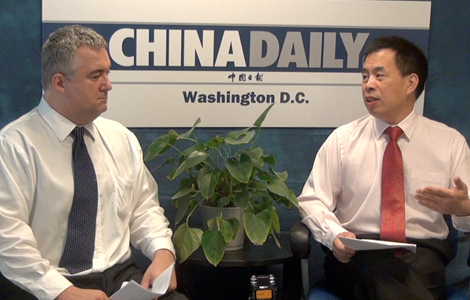A minute with: Wong Kar Wai on 'The Grandmaster' and kungfu
Updated: 2013-07-25 09:57
(Agencies)
|
|||||||||
 |
|
Director Wong Kar-wai waves during a news conference to promote his movie "The Grandmaster", the opening film of the Chinese Film Festival, in Seoul June 16, 2013.[Photo/Agencies] |
 |
The film tells the story of Ip - the trainer of kungfu film icon Bruce Lee - played by longtime Wong actor Tony Leung. It is divided into three parts that span his adulthood in 1930s' southern China and his Hong Kong exile in 1949.
Wong, 57, spoke with Reuters about the meaning of kungfu, exile and writing a fictional love story into Ip's life in the form of Gong Er, the daughter of a kungfu grandmaster and played by Chinese actress Zhang Ziyi.
Q: What motivated you to make a film about Ip Man?
A: To make a kungfu film in my way. I see today there's a lot (of) misconceptions or misinterpretations about some of these Chinese things, and one of them is the Chinese martial arts. The reason I wanted to make a film about Ip Man is because I believe a lot of people follow Chinese kungfu or kungfu films because of Bruce Lee.
Q: How well-known is Ip Man, who died at age 79 in 1972, in Hong Kong today?
A: He's not that popular, but he's very respected in the martial arts world, and in the case of Bruce Lee, he has become a legend. Once I knew I wanted to make a film about him, I had a meeting with both of his sons, and they showed me this short film shot three days before he passed away. ... He was doing demonstrations (in the film) of the Wing Chun (a kungfu style) combinations. He was 70-something (years old), very skinny, very weak, and he's doing this demonstration with a dummy in the living room.
Q: What did you make of that film?
A: It's very intriguing why he wanted to do this, because we all know that this combination is very, very legendary. It's the core technique of the Wing Chun combat skill. We watched this film - now you can find it on YouTube - but at that time, it was almost like a secret. What I think he intended to do is to do this: he wanted to preserve his technique so it can be shared and taught to future generations.
Q: How is your film different from other kungfu films?
A: I haven't seen any films talking about legacy. I've never seen a film that is so honest to the value of Chinese martial arts. I haven't seen many films that are serious about the technique. ... Everyone says Wing Chun is very good with the hands, but they don't know that actually the secret is in the footwork.
Q: The film is also a frustrated love story between Ip Man and Gong Er. What aspect of that storyline intrigued you?
A: I think it's more than just a physical or standard love story, because, in a way, they're also both great martial artists. I don't know if it's mutual attraction or mutual admiration, because when you talk to a martial artist he can be a very normal guy or old man, nothing special. But once they're doing a demonstration, they are different persons.
Q: Your films strongly emphasize place. What role does it play in the relationship of Ip Man and Gong Er, who both emigrate to Hong Kong?
A: They lose everything and the only thing that's common among these two people is the memories of their fighting and their skill and their passions toward martial arts. It's like two Russian immigrants who are chess grandmasters and they end up in New York and the only thing that's in common for them is chess, and here it's martial arts.
Q: What particularly about this period, World War Two and Mao's revolution, resonated with you?
A: This story tells you a lot about what is Hong Kong. Hong Kong is a place for all these immigrants after the war.
Q: You were born in Shanghai but moved to Hong Kong at age 5. Do you feel like an immigrant yourself?
A: We are the second generation. We can feel the sentiments of an exile from our previous generations. They're living in Hong Kong, but they're living in their own world. They're living with the same traditions, the same habit as before, and so in fact it's interesting for me to make this film. All the films I made before are about this generation. "In the Mood for Love" is about the people of the first generation, and they're stuck in Hong Kong and how to adapt to this new life.

 'Despicable' minions upset Depp's 'Lone Ranger' at box office
'Despicable' minions upset Depp's 'Lone Ranger' at box office
 'Taken 2' grabs movie box office crown
'Taken 2' grabs movie box office crown
 Rihanna's 'Diamonds' tops UK pop chart
Rihanna's 'Diamonds' tops UK pop chart
 Fans get look at vintage Rolling Stones
Fans get look at vintage Rolling Stones
 Celebrities attend Power of Women event
Celebrities attend Power of Women event
 Ang Lee breaks 'every rule' to make unlikely new Life of Pi film
Ang Lee breaks 'every rule' to make unlikely new Life of Pi film
 Rihanna almost thrown out of nightclub
Rihanna almost thrown out of nightclub
 'Dark Knight' wins weekend box office
'Dark Knight' wins weekend box office
Most Viewed
Editor's Picks

|

|

|

|

|

|
Today's Top News
Snowden's hopes of leaving airport dashed
US extends review of Shuanghui, Smithfield merger
'Few hundred' at Manila anti-China rally
Obama, Congress both losing public support
Abe seeking to 'contain' Beijing
Li points way for railways reform
VP visits Pyongyang for 60th truce anniversary
Palace: Royal baby named George Alexander Louis
US Weekly

|

|









